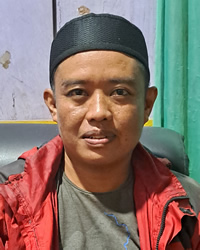Waru in Indonesia

Photo Source:
Anonymous
|
Send Joshua Project a map of this people group.
|
| People Name: | Waru |
| Country: | Indonesia |
| 10/40 Window: | Yes |
| Population: | 600 |
| World Population: | 600 |
| Primary Language: | Waru |
| Primary Religion: | Islam |
| Christian Adherents: | 0.00 % |
| Evangelicals: | 0.00 % |
| Scripture: | Translation Started |
| Ministry Resources: | No |
| Jesus Film: | No |
| Audio Recordings: | No |
| People Cluster: | Bungku-Bajau |
| Affinity Bloc: | Malay Peoples |
| Progress Level: |
|
Introduction / History
The Waru people live in the northern coastal region of Central Sulawesi, Indonesia, particularly around the areas near Toli-Toli and Buol. Their language, also called Waru, is part of the Austronesian language family and is closely related to several neighboring coastal languages. Historically, the Waru were small-scale farmers and fishermen who traded with other coastal and inland groups. Their contact with the outside world increased during the colonial period, when Dutch and later Indonesian administrators brought new forms of governance and education. Despite this, many Waru villages have maintained their traditional social structures and linguistic identity.
What Are Their Lives Like?
The Waru people live in small rural communities surrounded by forests and agricultural land. Their livelihood centers on farming rice, maize, and cassava, along with fishing in nearby rivers and coastal waters. Homes are typically built on wooden stilts with thatched or metal roofs, designed to withstand the tropical climate. Family ties and cooperation within the community are vital for survival, especially during planting and harvest seasons. Life remains simple and largely self-sustained, though young people are increasingly seeking education and work in urban areas. Access to healthcare, schooling, and modern infrastructure remains limited in the more remote Waru villages.
What Are Their Beliefs?
The Waru people identify broadly with Islam, which has been present in their region for centuries through traders from coastal Sulawesi and neighboring islands. Daily life follows many Islamic traditions, such as prayer and fasting, though local practices often include older animistic beliefs and customs tied to the natural world. Some villagers still hold ceremonies to honor ancestral spirits or seek protection from unseen forces. These traditional beliefs coexist with Islamic practices, shaping a religious life that blends both old and new worldviews.
What Are Their Needs?
Education opportunities are limited, and many children must travel far from home to continue schooling beyond the primary level. Health services are scarce, leaving families vulnerable to disease and maternal health challenges. Spiritually, there is a deep need for clear and culturally relevant teaching about God's love and forgiveness, as few have had the chance to hear or understand the gospel in their own language.
Prayer Points
Pray that the hearts of the Waru people will be open to hearing and understanding God's Word in a way that speaks to their culture.
Ask that new believers will grow strong in faith and share hope with their families and neighbors.
Pray for workers who can bring education, health, and the message of Jesus to the Waru region. Intercede for the translation and distribution of Scripture in the Waru language, that it may help the people discover the truth of God's grace.